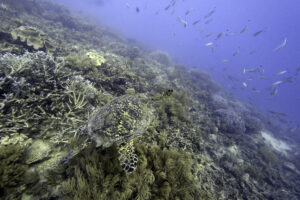World Scientists Want to Ban Deep-Sea Fishing
In a report released this week, marine scientists from around the world said industrial deep-sea fishing should be banned because it takes much longer for those fish to repopulate than species that live closer to shore.
In a report released this week, marine scientists from around the world said industrial deep-sea fishing should be banned because it takes much longer for those fish to repopulate than species that live closer to shore.
The report said that the unregulated deep seas are “more akin to a watery desert,” where people have concurrently depleted fish populations and destroyed deep-sea corals with invasive equipment.
The fishing industry moved to the high seas after supplies nearer to shore were deemed overfished. Unfortunately for the slow-growing deep-sea fish populations, the move spawned the sudden popularity of certain species — particularly orange roughy and the Patagonian toothfish, more widely known as Chilean sea bass — that is likely to keep up demand for the floundering fish species. –BF
Your support matters…The Washington Post:
Elliott Norse, president of the Marine Conservation Institute and the paper’s lead author, said the world has turned to deep-sea fishing “out of desperation” without realizing fish stocks there take much longer to recover.
“We’re now fishing in the worst places to fish,” Norse said in an interview. “These things don’t come back.”
As vessels use Global Positioning System devices and trawlers, which scrape massive metal plates across the sea bottom, the catch of deep-water species has increased sevenfold between 1960 and 2004, according to the U.N. Food and Agriculture Organization.
“What they’re doing out there is more like mining than fishing,” said Kevin Hassett, director of economic policy studies at the American Enterprise Institute.
Independent journalism is under threat and overshadowed by heavily funded mainstream media.
You can help level the playing field. Become a member.
Your tax-deductible contribution keeps us digging beneath the headlines to give you thought-provoking, investigative reporting and analysis that unearths what's really happening- without compromise.
Give today to support our courageous, independent journalists.






You need to be a supporter to comment.
There are currently no responses to this article.
Be the first to respond.